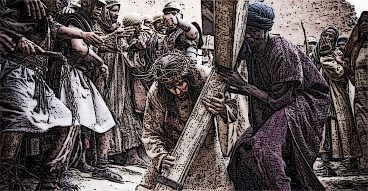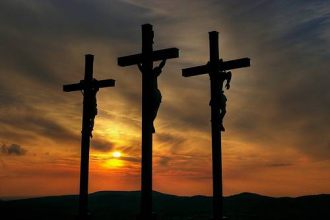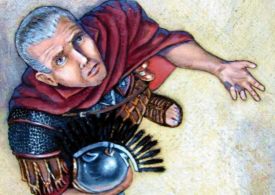Jesus Plus Nothing Bible Studies
Jesus Encounters: A common thief and a Roman centurion - Salvation at the cross!
by I Gordon
We have been looking recently at the impact that Jesus had on different people during His life. Today's study finds Jesus at His darkest and most difficult point - the crucifixion! And yet, even here amidst the pain and excruciating suffering, He wasn't thinking of Himself! We'll look at two who were there at that time who had their lives changes that very day! Let's look at the impact Jesus had on a certain thief and a Roman Centurion. This study is from Luke 23:26-47.
The one who carries the cross is always remembered...
Luke 23:26 NIV As they led him away, they seized Simon from Cyrene, who was on his way in from the country, and put the cross on him and made him carry it behind Jesus.
 Our story starts on the road to the cross. Jesus is unable to even carry the cross that He will soon be crucified on. Why is that? What had He been through? Within the last day Jesus had sweated blood in the garden of gethsemane, contemplating what would soon come to pass. He has had the sadness of the betrayal and abandonment of one of His own (well, never truly one of His own in a spiritual sense but one that Jesus had discipled and lived with over the last three years). Leading up to this point Jesus has been struck by the high priest and, most telling, been scourged at Pilate's command. The scourging itself was often enough to kill a man.
Our story starts on the road to the cross. Jesus is unable to even carry the cross that He will soon be crucified on. Why is that? What had He been through? Within the last day Jesus had sweated blood in the garden of gethsemane, contemplating what would soon come to pass. He has had the sadness of the betrayal and abandonment of one of His own (well, never truly one of His own in a spiritual sense but one that Jesus had discipled and lived with over the last three years). Leading up to this point Jesus has been struck by the high priest and, most telling, been scourged at Pilate's command. The scourging itself was often enough to kill a man.
So a man is ordered to carry the cross for Jesus. His name is Simon of Cyrene. We don't know much about Simon but Cyrene is commonly thought to have been in North Africa in the modern day country of Libya. While we don't know much about him, it is good that he is named and remembered! All disciples of Jesus are called to carry the cross and those that do will, like Simon, be remembered for eternity!
When the green tree becomes dry
Luke 23:27-31 NIV A large number of people followed him, including women who mourned and wailed for him. (28) Jesus turned and said to them, "Daughters of Jerusalem, do not weep for me; weep for yourselves and for your children. (29) For the time will come when you will say, 'Blessed are the barren women, the wombs that never bore and the breasts that never nursed!' (30) Then " 'they will say to the mountains, "Fall on us!" and to the hills, "Cover us!" ' (31) For if men do these things when the tree is green, what will happen when it is dry?"
Amongst all the weeping and support for Jesus along the way comes this troubling response by Jesus. Troubling for those listening anyway. He says that they shouldn't weep for Him but for themselves for the time is coming when they will say to the mountains 'Fall on us!' What is Jesus alluding to here? What does it mean that the tree is green but will be dry? In the immediate context, Jesus was alluding to the devastation that befall Jerusalem in 70 AD when it was sacked and destroyed by the Roman empire. But it also points to the last days when it will be played out again. The last 60 years have been (largely) the green day for the Western world. There are many born during this time that have never known war. But the dry is coming and the times are changing. As the world continues down it's current path of rejecting God and truth, one is coming that they they won't reject. He is the Antichrist and the world will ooh and argh over this one. But similar conditions to what Jesus predicted here will soon follow. Mankind will experience the judgement of God and will be crying out to the mountains to fall on them once again.
Revelation 6:15-17 NASB (15) Then the kings of the earth and the great men and the commanders and the rich and the strong and every slave and free man hid themselves in the caves and among the rocks of the mountains; (16) and they *said to the mountains and to the rocks, "Fall on us and hide us from the presence of Him who sits on the throne, and from the wrath of the Lamb; (17) for the great day of their wrath has come, and who is able to stand?"
Three men nailed to a tree
Luke 23:32-33 NIV Two other men, both criminals, were also led out with him to be executed. (33) When they came to the place called the Skull, there they crucified him, along with the criminals--one on his right, the other on his left.
 As they crucified the three 'criminals' that day, who among the crowd would have thought that One of them was... God? It is a crazy enough thought that the 'criminal' in the middle had done nothing wrong but was still being crucified. But that the man in the middle was actually the One who had created this world? He was One who could have stopped this whole painful end from happening if He so wished... but did not. The great I AM, the eternal Almighty God, came as a man and allowed Himself to be killed by the ones that He created. And He was willing to be identified with sinners in His death just as the prophecy had said:
As they crucified the three 'criminals' that day, who among the crowd would have thought that One of them was... God? It is a crazy enough thought that the 'criminal' in the middle had done nothing wrong but was still being crucified. But that the man in the middle was actually the One who had created this world? He was One who could have stopped this whole painful end from happening if He so wished... but did not. The great I AM, the eternal Almighty God, came as a man and allowed Himself to be killed by the ones that He created. And He was willing to be identified with sinners in His death just as the prophecy had said:
Isaiah 53:9 He was assigned a grave with the wicked, and with the rich in his death, though he had done no violence, nor was any deceit in his mouth.
The world mocks the King of kings
Luke 23:34-38 NIV Jesus said, "Father, forgive them, for they do not know what they are doing." And they divided up his clothes by casting lots. (35) The people stood watching, and the rulers even sneered at him. They said, "He saved others; let him save himself if he is the Christ of God, the Chosen One." (36) The soldiers also came up and mocked him. They offered him wine vinegar (37) and said, "If you are the king of the Jews, save yourself." (38) There was a written notice above him, which read: THIS IS THE KING OF THE JEWS.
Amongst the mocking that the world unleashed on Jesus, the Son of God, came the response from Jesus that shows the difference between God and man. He didn't return hatred with hatred or mocking with venom. He simply prayed and asked the Father to forgive them! Do you think those mocking were forgiven? Jesus intercedes for them but if they harden their hearts and don't want forgiveness they won't find it. But Jesus fulfilled His own command to 'love your enemies, bless those who curse you, do good for those who hate you, and pray for those who spitefully use you and persecute you' (Mat_5:44). We are called to forgive others and this keeps us from bitterness and resentment. Jesus is the ultimate example of what to do (like normal!)
In the midst of their mocking they taunted Jesus to come down and save Himself. That got me thinking... What would have happened had He saved Himself? He wouldn't have been able to save others. It was the fact that He wanted to save others that He didn't save Himself. As it was written:
Isaiah 53:12 Therefore I will give him a portion among the great, and he will divide the spoils with the strong, because he poured out his life unto death, and was numbered with the transgressors. For he bore the sin of many, and made intercession for the transgressors.
Not that the mocking sneering onlookers would have been able to grasp this! Who else was mocking Him? While not recorded in Luke, the book of Mathew tells us that BOTH criminals (one on each side) were also mocking Jesus at the start. And yet one changed. What caused that do you think? What impact would Jesus' words and attitude from the cross have had on the one thief who saw His own sin?
Coming to Christ for deliverance from problems or forgiveness of sin?
Luke 23:39-41 NIV One of the criminals who hung there hurled insults at him: "Aren't you the Christ? Save yourself and us!" (40) But the other criminal rebuked him. "Don't you fear God," he said, "since you are under the same sentence? (41) We are punished justly, for we are getting what our deeds deserve. But this man has done nothing wrong."
Here is an example of one reason why some call on Christ today. Like one of the criminals they just want to get out of their current predicament. They don't have a conviction of sin. They aren't repentant. But they are willing to 'try' Jesus if it means that they can get some deliverance from some problem they have. This criminal probably didn't even care about whether Jesus saved Himself... just as long as he found a way off this cross! There is a change occurring in the second criminal though. He rightfully sees that the other has no fear of God or conviction of sin, and is not sorry for what he has done. He reminds the other criminal that they deserve their punishment but recognizes that Jesus has done nothing wrong. A change is happening in his heart!
The wonder of salvation!
Luke 23:42-43 NIV Then he said, "Jesus, remember me when you come into your kingdom. " (43) Jesus answered him, "I tell you the truth, today you will be with me in paradise."
And then, in the midst of the pain as death comes close, comes this remarkable plea. Here, as this thief is about to enter eternity, comes a salvation prayer - "Jesus remember me when you come into your kingdom!' Now, that probably doesn't sound like a salvation prayer but it is. He recognized Jesus as the Messiah. He recognized that He would come again. The thief knew his own sin and acknowledged that but He wanted eternal life and wanted to participate in the coming kingdom age. This whole salvation is remarkable and instructive.
William MacDonald in 'The Believers Bible Commentary' (Big blue) writes the following concerning Jesus' response:
"Today - what speed! With Me - what company! In Paradise - what happiness!
The way the penitent was saved is the only way in which man can be saved. He could do no good works; he could not get baptized or perform anything else. All he could do was to cast himself in faith as a lost sinner upon the Lord. Nor was his salvation a life-long, progressive work (as some teach on salvation); it was instantaneous. Nor was there any 'purgatory' for him. He expected to be remembered in the Kingdom to come. Instead of that he hears, 'Verily I say unto thee, today thou shalt be with me in paradise.' The attempt by soul-sleepers, restorationists and others to put the comma after 'today' is a deceptive invention to bring the Word of God into line with their evil doctrines."
R. Erdman writes: "This story reveals the truth to us that salvation is conditioned upon repentance and faith. However, it contains other important messages also. It declares that salvation is independent of sacraments. The thief had never been baptized, nor had he partaken of the Lord's Supper. ... He did in fact boldly profess his faith in the presence of a hostile crowd and amid the taunts and jeers of rulers and soldiers, yet he was saved without any formal rites. It is further evident that salvation is independent of good works. ... It is also seen that there is no 'sleep of the soul.' The body may sleep, but consciousness exists after death. Again it is evident that there is no 'purgatory.' Out of a life of sin and shame, the penitent robber passed immediately into a state of blessedness. Again it may be remarked that salvation is not universal. There were two robbers; only one was saved. Last of all it may be noted that the very essence of the joy which lies beyond death consists in personal communion with Christ. The heart of the promise to the dying thief was this: 'Thou shalt be with me.' This is our blessed assurance, that to depart is 'to be with Christ' which is 'very far better.'
Concerning the two thieves on the cross and what we can learn from their end, someone has wisely said 'One thief was saved so there would always be hope; but only one so there would not be presumption!'
And what of the centurion?
Luke 23:44-47 NIV It was now about the sixth hour, and darkness came over the whole land until the ninth hour, (45) for the sun stopped shining. And the curtain of the temple was torn in two. (46) Jesus called out with a loud voice, "Father, into your hands I commit my spirit." When he had said this, he breathed his last. (47) The centurion, seeing what had happened, praised God and said, "Surely this was a righteous man."
 Finally, imagine being the centurion. It is your job to stand guard and watch the entire proceedings. You have been assigned to many crucifixions in the past and death is a common part of your job. But this one is way different! You have never seen or heard one like this before. Why did it go dark for three hours in the middle of the day? That was kind of spooky! Where did Jesus, even while facing death in the face, get His ability to forgive his accusers and mockers? Who else could speak with such authority so as to promise a petty thief a place in paradise with Him? And even in the very act of dying, it seemed like Jesus was in control, only dying after committing His spirit into the 'Fathers hands'. He was this man?
Finally, imagine being the centurion. It is your job to stand guard and watch the entire proceedings. You have been assigned to many crucifixions in the past and death is a common part of your job. But this one is way different! You have never seen or heard one like this before. Why did it go dark for three hours in the middle of the day? That was kind of spooky! Where did Jesus, even while facing death in the face, get His ability to forgive his accusers and mockers? Who else could speak with such authority so as to promise a petty thief a place in paradise with Him? And even in the very act of dying, it seemed like Jesus was in control, only dying after committing His spirit into the 'Fathers hands'. He was this man?
Luke tells us only partially what conclusion the centurion who saw all these things came to:
He "praised God and said 'surely this was a righteous man'". But that is not the full story. Mathew records more details:
Matthew 27:54 NIV When the centurion and those with him who were guarding Jesus saw the earthquake and all that had happened, they were terrified, and exclaimed, "Surely he was the Son of God!"
'He was the Son of God'. That was the testimony of a previous unbeliever that was a personal witness to Jesus' crucifixion that day. Even at the cross this 'Jesus encounter' led to salvation. One thief was saved and more than likely one centurion (and possibly more) were as well. What a story they will have to tell in Heaven! But always remember that we can 'encounter' Jesus today. We may not have seen these details with our physical eyes like the thief and the centurion did, but as Jesus said to Thomas after His resurrection...
John 20:29 NIV "Because you have seen me, you have believed; blessed are those who have not seen and yet have believed."
